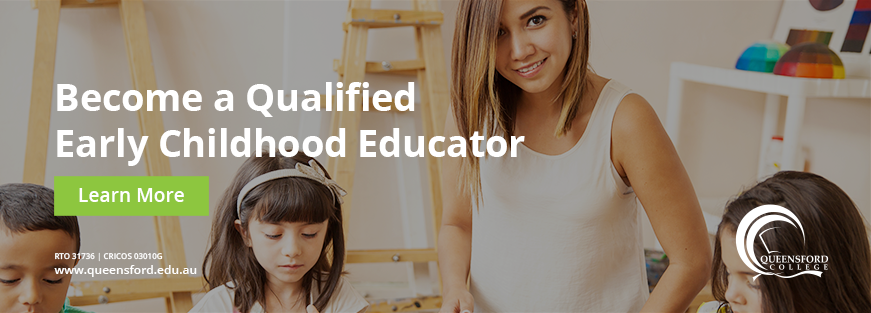An Early Childhood Educator or Caregiver has, and always will, continue to play an important role in our society. As an Early Childhood Educator you must help and assist in the development of many things including; a child’s social, emotional and physical skills, personal well-being and growth, educational needs and learning.
Together in a team, these educators work towards creating a supportive network and safe environment for young children and infants in day-cares across Australia. By providing quality learning resources and engaging activities every day these educators help nurture the educational development of many young children in day-care and preschool nation-wide.
Ultimately, an Early Childhood Educator or Caregiver can be described in one word: role model. This is because they are responsible for helping shape the future; the next generation of leaders, doctors, teachers, engineers and inventors.
Does this sound like you? A child care qualification such as a Diploma of Early Childhood Education and Care may be the right course for you!

Find out how you can study an early child care course by exploring these three highly effective study options below:
1. Online
As a student with many personal commitments (e.g.: work, hobbies, carer responsibilities) studying a childcare course or early childhood education qualification online may be the best option for you. Studying online is also a popular option for many students who live long distances from major cities, universities and vocational training institutes. For this very reason, many distance learning courses are available to students Australia wide.
Studying online has many benefits. These include:
As a student studying online at an online college the costs are considerably reduced. This is because the college doesn’t have to pay rent or maintain college buildings, classrooms or common areas. This major saving cost is reflected in student’s tuition and course fees. Studying online also means you don’t have to fork out money for public transport fares or petrol to get yourself to and from a college campus.
Studying online means you can study anywhere. Literally anywhere. Study at home, in the park or at your favourite coffee shop! By enrolling in an online childcare course you can study in an environment that is best suited to our own learning (like on the couch in your pyjamas and fluffy slippers) and at your own pace.
Enjoy the flexibility of online study and the convenience of tailoring your academic timetable to your daily routine. Instead of allowing study to control your life, you can control the study. Decide when and how you can study without interruptions to your personal commitments. This also means you can balance work, family and your social life without stress (and everything in-between).
Depending on what kind of learner you are, studying a childcare course or early childhood education qualification online may help you participate in class discussions and the sharing of ideas. Being able to interact with teachers and other student’s online give students the confidence to join in-class debates and discussions. This results in a richer learning outcome and assists in the understanding of key subject ideas.

2. On Campus
Studying a childcare course or early childhood education qualification on campus is a very traditional, and a popular study method for many international and domestic students. Students who enjoy this study option are most likely linguistic learners or intrapersonal learners. According to human behaviour specialist Scott Black a linguistic learner “is someone who learns best through reading, writing and listening to someone speak” and an intrapersonal learner is “someone who learns by relating to others… shares stories, works in teams, compares ideas with other students.”
If you are a linguistic or intrapersonal learner, studying on campus may be an ideal study option for these reasons:
As a student studying on campus at an Australian university or educational institute/college, you will have unlimited access to a wide range of campus facilities. This includes the use of a library and its learning resources, texts books, computers, research services and library assistants. This also includes athletic facilities like a gym, pool and running track. Oh, and don’t forget access to real-time learning resources like your peers! This all contributes to an improved learning environment for linguistic and intrapersonal learners.
A massive benefit by choosing to study a childcare on campus instead of at an online college is that teachers are able to recognise your immediate learning strengths and weaknesses. This is because students and teachers are face-to-face almost every day and teachers are able to observe students in class. This creates a more personalised style of learning, aide’s communication and decreases any learning barriers.
Spread your social butterfly wings and make new friends by studying on campus. Students who choose to study childcare on campus will most likely live on campus through student housing and accommodation and make a bunch of new friends. In-between classes, you’ll also be able to bond with your classmates at lunch and talk about class topics and assignments.
For the complete opposite reasons to why a student may love studying a childcare course online, the structure of studying on campus requires a student to follow a timetable and attended pre-organised classes at certain times on certain days. If you are a student who finds this structure encouraging to help you stay on track of your learning journey, choosing to study on campus may be a great study option for you!

3. Blended Method
Blended learning is a new hybrid teaching method that combines a traditional classroom; modern technology and independent study. It is a new teaching method that is both face-to-face and online.
According to Mind Flash, a leading learning management service, blended learning has three primary components. These include: “in-person classroom activities lead by a trained educator, online learning materials (such as pre-recorded lectures and quizzes by the same educator) and structured independent study time.”
This method of studying has proven to be highly effective for all learners. Find out why:
Choosing a blended method of studying a childcare course or early childhood education qualification opens the door to a unique and informal interactive learning journey. Blended learning means classroom time isn’t what you’d expect it to be. Instead of sitting and taking notes about childcare from a board, structured exercises around this topic are led by the facilitator. These activities, which emphasise the application of the course curriculum, are completed by students who enjoy being engaged and active during class.
It also flips homework expectations. With blended learning, students are expected to watch lectures for homework, and do their homework during class time. This is because class time is considered a time to complete activities that require direct interaction!
This means childcare course materials is posted online by the course facilitator to empower students to make the most of their independent study time. Students may use these materials to work independently in the classroom or from home. Occasionally students may meet up with their facilitator to ask questions, discuss current work or review their academic progress.
Be independent and in-charge of your own learning. Blended learning requires students to use their independent study time effectively. This means each student is able to work at their own pace, and in their own time – however, are still monitored by afar from course facilitators.

Do you have what it takes to become a qualified Early Childhood Educator? Request a brochure here. Or if you prefer to speak to a Course Advisor, call us on 1300 236 364.
